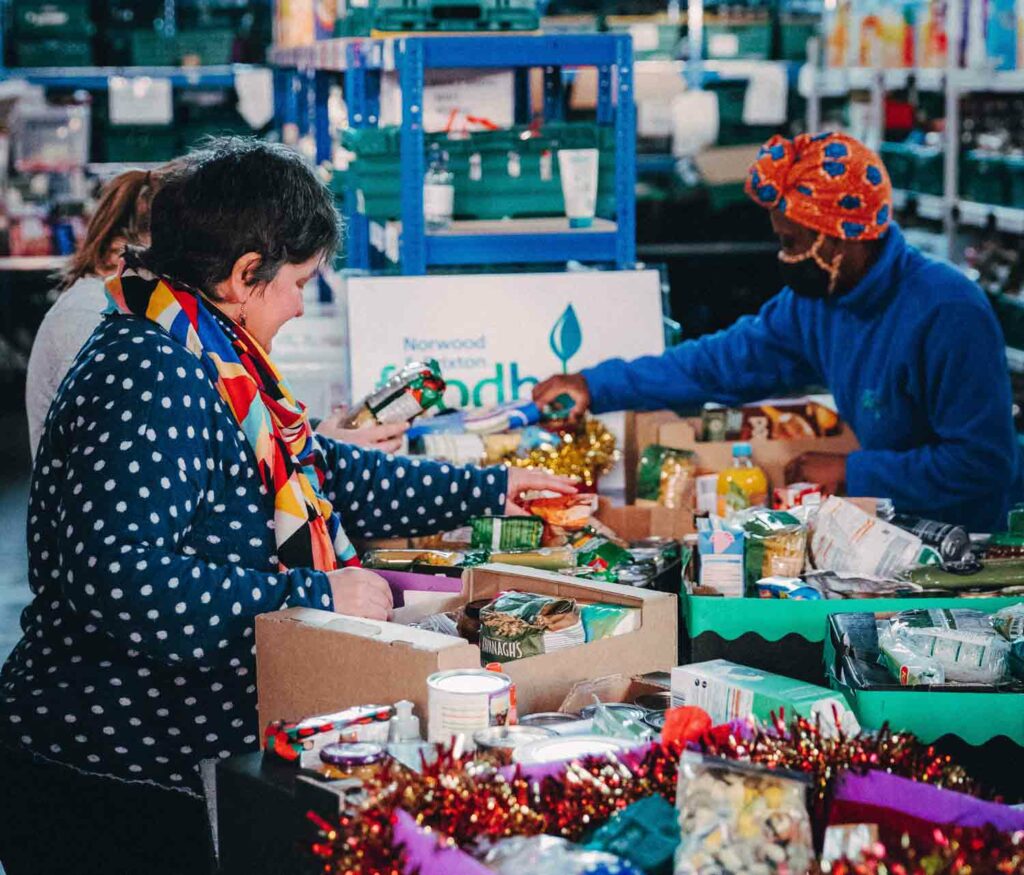
Despite an overall increase of 4% in the number of food parcels distributed in London in spring and summer this year compared to 2023, figures for Lambeth show a small drop.
The anti-poverty charity Trussell says today (20 November) that its community of food banks in London, which include the Norwood and Brixton bank, distributed just over 222,160 emergency food parcels between 1 April and 30 September this year.
This includes 76,361 parcels provided for children facing hunger across the region.
Most of the food parcels distributed in the UK were to families with children, with 63% of the total number of parcels going to households with children aged 0–16, the charity reports.
More than 277,000 people visited a food bank in the Trussell community for the first time between April and September.
The total number of parcels provided across the UK as a whole is 67,000 fewer compared to the same period last year, representing a 4% decrease nationwide.
Trussell says there are a number of possible reasons for this small dip, including the gradual slowdown in the extortionate price increases for food and household bills in recent years, and an end to the local housing allowance freeze in April, bringing support for private renters back in line with local rents.
However, the charity says it is difficult to say if there has been an actual drop in hunger and hardship. The need for emergency food is still persistently high, and the number of parcels provided across the UK is 69% greater for than the same period in 2019.
The total number of food parcels distributed in Lambeth for the April-September period in 2019 was 7,335; in. 2023 it was 12,454; and this year 11,512.
Trussell says that, while food banks are a last resort for people who are isolated, facing hunger, and without enough money to live on, many are at breaking point due to years of growing numbers of people forced through their doors.
Winter is often the busiest time for food banks and Trussell tody clls on the public to continue to play their part and support their local food banks to meet this urgent need, by volunteering, donating, fundraising or campaigning to help end hunger.
Many food banks need vital funds to provide services beyond distributing emergency food, such as advice and support that unlocks money someone should be getting and services aimed at helping people out of financial hardship.
“The evidence is clear that hunger in the UK isn’t a food problem,” says Trussell. “It’s an income problem.”
People are being forced to turn to food banks because incomes from work, and social security payments, do not cover the cost of the essentials, such as food, bills, and toiletries.
Trussell has joined forces with hundreds of communities, food banks and charities. including the Joseph Rowntree Foundation, to call on the UK government to take urgent action now.
Emma Revie, chief executive of Trussell, said: “The sheer numbers of people in London still facing hunger and hardship is heartbreaking. This cannot go on and we refuse to stand by while so many of us are pushed to the brink, left without enough money to live on.
Figures from Trussell cannot be used to fully explain the scale of food bank use across the UK. The Independent Food Aid Network (IFAN) has identified at least 1,172 independent food banks, while there are also Salvation Army food banks as well as food banks run from schools and hospitals.
There are also thousands of other food aid providers including soup kitchens and social supermarkets.
More than 450 food banks were part of the Trussell community in April-September 2024. Many of these distribute food parcels from several locations.
The charity says that comparisons in the growth in food parcel distribution between areas should be made with caution.
“There are many different factors that may influence the number of parcels distributed within a local area, e.g. prevalance of other food banks or charitable food provision, changes to local unemployment rates, food banks opening or closing individual locations,” it says.
“Food parcels are linked to the local authority/parliamentary constituency based on where distribution centres are located, rather than where the person needing support is living.”
For example, if a person living in Bromley receives a parcel from a food bank in Lambeth the parcel is recorded in Trussell statistics under Lambeth.
Trussell said that, due to the significant levels of need, many food banks experienced in the past six months, it has not been possible for all of them to input their data in time for the current statistical release.
“In some areas, therefore, the number of emergency food parcels distributed is not up to date. As a result, if there are significant drops in the number of parcels in a certain area, this needs to be interpreted with caution,” the charity said.






